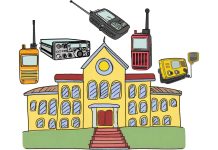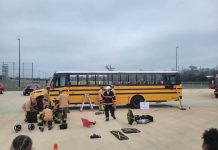A bill was introduced in the Nevada Senate last week that seeks to clarify a law passed last spring that requires all plastic parts in the school bus engine compartment to meet an engineering classification first developed for household appliances. That provision would have made it virtually impossible for school districts to purchase new buses.
Senate Bill 382 was filed last Monday and referred to the Committee on Education. The Nevada Department of Education supports the added language that requires a fire suppression or fire extinguisher system installed in the engine compartment if the engine and any compartment accessories do not meet the V-0 classification for plastics, in accordance with Standard UL 94.The plastic parts are treated with Brominated Fire Retardants, or BFRs, chemicals that may emit toxic fumes when subjected to open flame, according to the U.S. EPA.
The bill also changes the date newly manufactured buses must meet the requirement for having installed suppression systems to Jan. 1, 2016 from the previous date of Jan. 1, 2014. As for the plastic components in the engine compartment, which can be circumvented by the presence of a supression system, the date of compliance was changed to July 1, 2016 from July 1, 2016. Additional language states exactly what engine parts must be V-0 classified, namely thoese located within 100 mm “directly above an exhaust component that is not shielded,” which includes the catalytic converter, an exhaust gas recirculation pipe that carries uncooled exhaust gas, an exhaust manifold, or an exhaust pipe.
Last year, the Engine Manufacturers Association opposed the new law in Nevada as well as similar bills that eventually died in Illinois and Maryland because of the extra costs they would add to bus purchases.
“Obviously, it would be difficult if not impossible to build engines for just one state,” EMA spokesman Joseph Suchecki told School Transportation News last May.
The new Nevada language was added after a meeting held last November between Clark County School District officials and the legal team that represented Citizens for Fire Safety, a group organized and supported by fire suppression chemical companies that wrote the law passed last year in Nevada as well as the bills in Illinois and Maryland. Frank Giordano, director of transportation for Clark County, John Howard, Sr., the district’s vehicle maintenance director, and a representative of Clark County’s government affairs representatives sought to educate the group on how the V-0 classification requirement would adversely affect the way school buses are built.
“The discussion was focused on how to best serve the concerns for student safety and still be able to work within reasonable abilities of the bus manufacturers,” Giordano said. “This started the conversation that led to the current proposed Bill to amend the current law.”
The best short-term solution, as is stated in the new bill, gives bus manufacturers until 2016 to install the fire suppression systems in the engine compartments. But, according to Giordano, the law carries with it a price tag, as he said it currently costs about $3,500 per bus to add a supression system. He added that Clark County has ordered 105 school buses with these systems included, as the district averages “at least one good fire a year.”
“We’ve just been lucky that there were no kids on the bus or, in one instance where there was only one student onboard, we got them (evacuated),” he said. “This was the best compromise without a big fight.”
While the Nevada Department of Education provided a response in favor of the new verbiage to Senate Committee on Education last week, concern remains about how the cost of fire suppression systems will affect transportation budgets. Diana Hollander, state director at the Nevada Department of Education, said there are some remaining questions that need answers, including what organization — the Highway Patrol, the manufacturer of the suppression system, the fire department, etc. — will inspect the systems during the state-mandated, semi-annually bus inspections.














